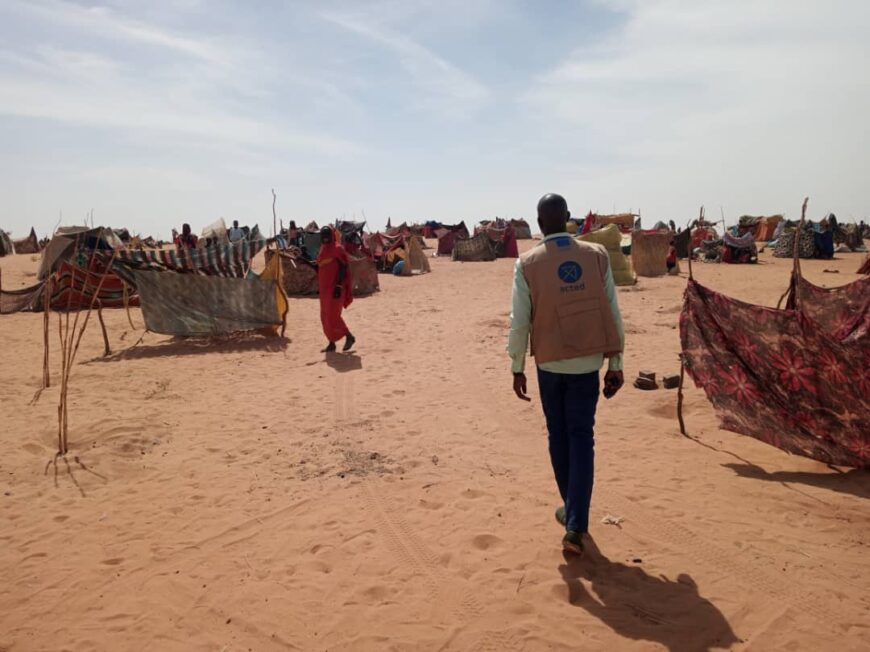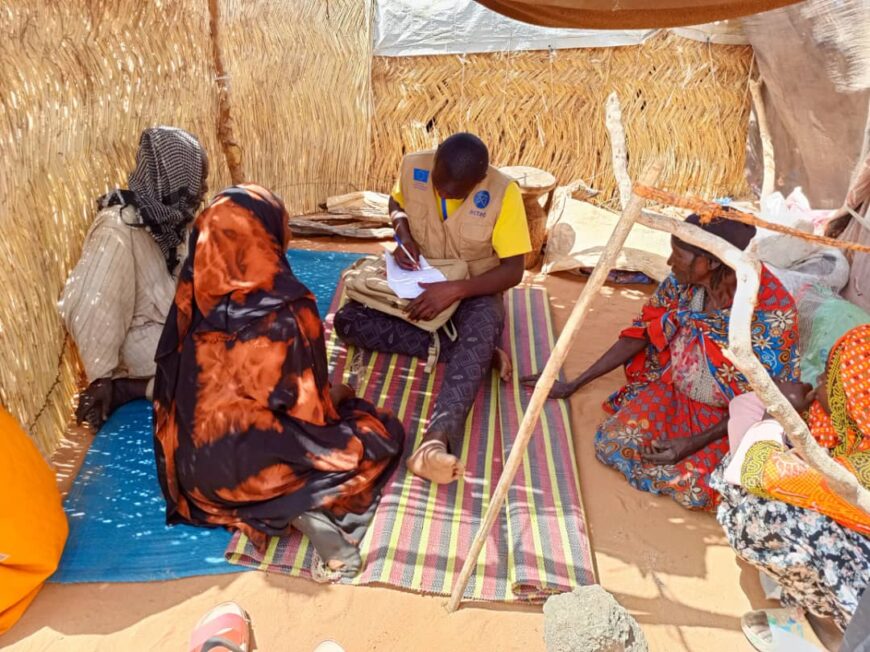Following the outbreak of the conflict in Sudan on 15 April 2023, 559,423 displaced persons settled in the provinces of Eastern Chad, including more than 384,000 in Ouaddai Province. Since the start of the conflict, the Chadian government, CNARR, local authorities and the humanitarian community have mobilised to provide vital assistance and essential services in spontaneous sites and camps. Around 200 to 300 people continue to cross the border at Adré every day.

Right from the start of the conflict, the Chadian government put in place a strategy of relocation to equipped camps to guarantee displaced families a safe place to live, far from the border, with a range of essential structures and services. By February 2024, 48% of the displaced population had been relocated to sites equipped with shelters, WASH infrastructure and health and protection services.
Despite this relocation strategy, the number of arrivals remains constant and spontaneous settlements, particularly in Adré, are still the first thing people do when they arrive in Chad.
With ECHO’s support, Acted launched a GSAT (temporary reception site management) activity in January 2024 to support the CNARR (Commission Nationale d’Accueil de Réinsertion des Réfugiés) and local authorities in the management and coordination of the Adré informal reception site, the main entry point to Chad where more than 120,000 people are still waiting to be relocated.
Qu'est-ce que le GSAT ?
Camp Coordination and Camp Management (CCCM) is an approach used in the context of community displacement. GSAT adopts a multi-sectoral methodology to improve the quality of life and security of displaced people, by supporting dignified living conditions and protection in line with international standards. The aim is to ensure equitable access to assistance, protection and services for people living in displacement sites, in order to improve their quality of life and dignity, while seeking and advocating sustainable solutions. GSAT also aims to support the coordination of the response on site in order to ensure optimal coverage of all needs, but also to avoid any duplication of efforts and resources, particularly in a particularly tight funding context.
In Chad, Acted has launched new GSAT activities in support of the CNARR for the management and coordination of the Adré informal site. A total of 4 GSAT teams have been deployed on the site to: strengthen the coordination of actors on the site to ensure coverage of needs, improve governance of the site through the strengthening of community structures and training of authorities, ensure effective participation of populations in the response and strong accountability of actors, strengthen protection on the site through safety audits and site maintenance activities.
At the same time, Acted strives to support conditions conducive to sustainable solutions, through advocacy with local authorities and humanitarian actors to ensure that the wishes of displaced and host communities are taken into account.
Strengthening the coordination and capacity of local authorities and communities
The GSAT approach implemented by Acted in Chad involves the inclusion of local authorities and communities in the implementation of the response.
This involvement is based on capacity building activities and participation at the local level in order to encourage the resumption of site management at the end of Acted’s intervention. In particular, Acted’s GSAT teams offer various training courses to CNARR and community leaders, as well as support for the creation of local governance structures.
Acted carries out needs assessments and profiling on the Adré site. This activity, which is essential to the GSAT, enables us to gain a better understanding of the dynamics of the site, identify priority needs and gaps and take stock of the humanitarian services available. Throughout this process, Acted ensures that the CNARR, community leaders and the humanitarian community are involved. In order to facilitate the coordination effort between the actors and to have a holistic response, Acted ensures that the information gathered is shared with all the stakeholders invested in the Adré site.
Guaranteeing safety and dignified living conditions for displaced people

Guaranteeing the dignity, well-being and security of displaced populations is also an essential component of GSAT. On the Adré site, Acted is implementing several activities to guarantee a safe environment for refugee and returnee households.
The GSAT teams carry out safety audits on the site accompanied by the beneficiaries in order to assess the needs for improvements and identify the risks linked to the configuration. Maintenance work (installation of lighting, roadworks, etc.) will then be carried out to provide a safer environment, particularly for people with special needs.
Accountability and communication are important factors in enabling beneficiaries to take full control of their situation. Acted disseminates key information on available humanitarian services, awareness-raising messages and relocations through various channels. This two-way communication is essential to enable populations to make informed choices.
Through its GSAT intervention at the Adré site, Acted is helping to strengthen the management of the humanitarian response by the CNARR and local authorities, to support more effective and appropriate humanitarian coordination, and to guarantee a dignified and secure living environment for more than 120,000 displaced people. With the intensity of the fighting in Sudan, the Chadian authorities are expecting a total of 910,000 displaced people by the end of 2024. Over the coming months, Acted will aim to deploy its GSAT activities in new sites in order to offer dignified and safe living conditions to as many people as possible.